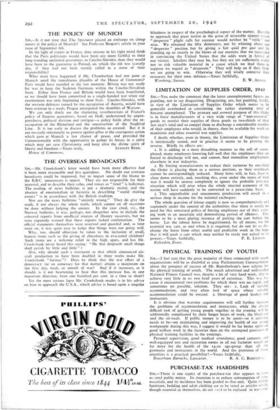THE OVERSEAS BROADCASTS
Sta,—Mr. Crookshank's letter would have been more effective had it been more reasonable and less querulous. No doubt our overseas broadcasts could be improved, but to impart some of the blame to the B.B.C. announcers is unjust. They are not responsible for their material, and to describe their calm, cool voices as " tired " is ludicrous. The reading of news bulletins is not a dramatic recital, and the absence of emotionalism or hysteria in describing " world shaking events " is in accordance with the British tradition.
Nor are the news bulletins " entirely wrong." They do give the truth, if not always the whole truth, which cannot on all occasions be done without helping the enemy. In the case cited, viz., the Norway bulletins, it was, perhaps, not altogether wise to include the coloured reports from unofficial sources of illusory successes, but we were expressly warned that these reports lacked confirmation. The official statements themselves were reserved and guarded and, as time went on, it was quite easy to judge that things were not going well.
Why, too, should objection be taken to the inclusion of small, human items such as the giving of chocolates to evacuated children? Such items are a welcome relief to the high spots, and has Mr. Crookshank never heard this saying : " He that despiseth small things shall perish by little and little " ?
Also, why should such a statement as that which announced air- craft production to have been doubled in three weeks make Mr. Crookshank " furious "? Does he think that the war effort of a democracy (or an autocracy for that matter) attains a maximum on the first day, week, or month of war? And if it increases, as it should, is it not heartening to hear that this increase has, in one important direction, been one hundred per cent, in a time so short? Yet the most serious lapse Mr. Crookshank mades is in his advice on how to approach the U.S.A., which advice is based upon a singular
blindness in respect of the psychological aspect of the matter. Humbly to approach that great nation in the guise of miserable sinners who " desperate " plight calls for succour would neither be " virile nor wise. We obtained the fifty destroyers, not by whining about our " desperate " position but by giving a fair quid pro quo and by standing up so stoutly to the blows of our enemies that we succeeded in convincing the United States that the odds were in favour of our victory. Idealists they may be, but they are yet sufficiently realist not to risk valuable material in a cause which we lead them to suppose we regard as " desperate." They will help us if they think we are going to win. Otherwise they will wisely conserve their resources for their own defence.—Yours faithfully, Worthing, Sussex. E. W. ADAMS.


























 Previous page
Previous page